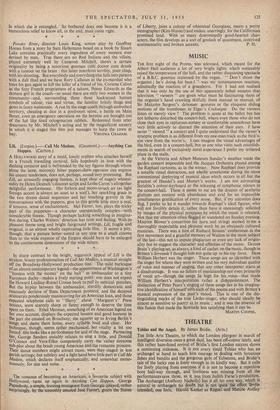MUSIC
THE first night of the Proms. was televised, which meant for the Albert Hall audience a lot of very bright lights, which noticeably raised the temperature of the hall, and the rather disquieting spectacle of a B.B.C. gunman stationed by the organ. " Don't shoot the organist ; he's doing his best I " was my instantaneous reaction, admittedly the reaction of a greenhorn. For I had not realised that it was only by the use of this apparently lethal weapon that television " viewers " are given what must be fascinating shots of the organist's hand crawling skilfully from manual to manual, of Sir Malcolm Sargent's debonair gestures or the eloquent sliding motions of the trombones in Elgar's Cockaigne. Do the viewers listen or merely view ? The problem is acute at the ballet but has not hitherto disturbed the concert-hall, where even those who do not close their eyes in rapturous ecstasy or comfortable somnolence have very little actively to distract the attention of their ears. I have never " viewed " a concert and I quite understand that the viewer's synoptic problem is as different from my one-man track as the bird's- eye view from the worm's. I can imagine the visual advantages of the, bird, even in a concert-hall, but as one who visits such establish- ments in search of exclusively aural experience I prefer my tethered place in the stalls. At the Victoria and Albert Museum Sunday's weather made the garden concert impossible and the Jacques Orchestra played among the Raphael cartoons, as in the winter, Now Raphael does provide a notable visual distraction, not wholly unwelcome during the more conventional deploying of musical ideas which occurs in all but the greatest of Handel's and Mozart's works. I am not advocating Scriabin's colour-keyboard or the releasing of symphonic odours in the concert-hall. These it seems to me are the dreams of aesthetic gluttons not content with abundance and avid for an impossible simultaneous gratification of every sense. But, if my attention does flag, I prefer to let it wander towards Raphael's ideal figures, who will not forcibly detain it, rather than have it unceasingly solicited by images of the physical processes by which the music is released. Not that my attention often flagged or wandered on Sunday evening. Maurice Blower's concertino for horn and strings seemed to me a thoroughly respectable and pleasant work by an obviously cultured musician. There was a hint of Richard Strauss' exuberance in the first movement and a grateful memory of Walton in the main subject of the last—this not to impute plagiarism or even any lack of origin- ality but to suggest the character and affinities of the male. Dennis Brain's playing set, as always, a kind of cachet on the music, though in Britten's Serenade I thought him not quite up to his top form. Here William Herbert was the singer. These songs are so identified with the singer for whom they were written and his very individual quality of voice and manner of singing, that any other interpreter starts at a disadvantage. It was no failure of musicianship nor even primarily of vocal art—though the songs lie high for his,voice—that made William Herbert's interpretation rather a disappointment. The distinction of Peter Pears's singing of these songs lies in his imagina- tive identification of himself with each of the poems and with Britten's musical expression of the poet's mood. This is one of the dis- tinguishing marks of the true Lieder-singer, who should ideally be almost as sensitive to poetry as to music ; and it was the absence of this fusion that made the Serenade less satisfying than it can be.
MARTIN COOPER.


































 Previous page
Previous page